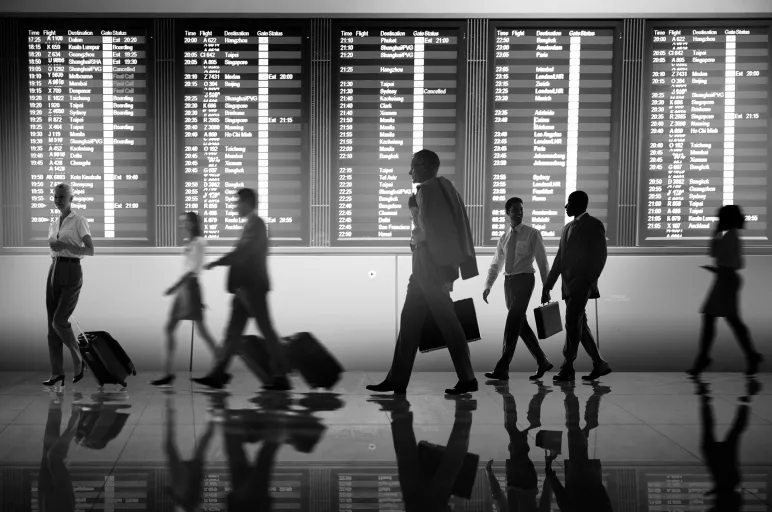
Basic Economy Fare ― What Does That Mean for Corporate Travelers?
January 04, 2018 4 minutes read
Basic Economy Fare (BEF), a new non-standard fare option for price-sensitive travelers is being introduced by all major global airlines. Each airline has its own set of conditions and some of the restrictions include non-refundable, non-upgradeable tickets, no choice in seating and receiving seat assignment only after check-in, no carry-on baggage, no access to overhead bin, etc. These ticket holders, in some cases, can’t earn frequent-flier miles or other rewards. However, these ticket holders can overcome some restrictions — either by paying an additional fee or by being an elite loyalty member/having a credit card affiliated with the carrier.
Predictably, basic economy has been condemned as yet another step in the industry’s relentless drive to strip all comfort and grace from steerage class. While adding these new base fares, carriers also raised prices on traditional economy seats. The logic behind this? If a consumer sees that there’s an even lower class, they’ll pay a little more for the next level up, thus being tricked into buying the slightly expensive economy class tickets.
The cost of basic economy comes from not just the ticket price, but many small expenses that get added to the purchase. Analyzing the true cost of basic economy requires finance teams to associate all of these disparate expenses with the same trip. Aggregating this travel spend is essential, insightful, and possibly influential on the adoption of basic economy.
Why Did Airlines Launch Basic Economy?
If industry veterans are to be believed, the launch of basic economy is a trick to push corporate travelers into business class, the price of which has quietly increased. Meanwhile, another school of thought explains it as an attempt to gain market share against insurgent low-cost carriers. Because consumers get miles and other rewards, many prefer to stick with one carrier for both business and leisure. If the airlines don’t compete in the low-cost category, they miss acquiring those customers and hence the introduction of a less expensive (commoditized) product. The savings from basic economy are only about $20-$50 per flight. In return, passengers end up paying for carry-ons, overhead access, seat assignments, and pretty much everything. Refunds and upgrades aren’t permitted. By offering a fare class with that many restrictions, airlines have taken away much of what corporate travelers typically seek, causing businesses to avoid basic economy altogether.
How Is BEF Affecting Travel Policies?
With the advent of BEF, travel policymakers have an uphill task. Basic economy fares are often unavailable on corporate-travel booking systems of large enterprises as their travelers require more flexibility. However, small- and medium-sized enterprises, who advise their travelers to opt for the lowest-priced tickets, may have to make a collective decision to adopt the BEF (or perhaps not). While some businesses and companies have already adopted BEF, some of them have completely excluded BEF from their travel bookings. However, companies adopting BEF might end up paying more as there is always a chance of last-minute cancellation. This cancellation might happen due to extended meetings or last-minute changes in the itinerary of travelers due to which the company might end up paying more as no refund on cancellation or rescheduling the flights is applicable for BEF bookings. Travelers on BEF might end up with a lot of discomfort and difficulties due to inflexible policies. Travel buyers must be aware of the host of adjustments that travelers have to make, before incorporating BEF as a part of their go-to cost reduction strategy.
Who Should Opt for BEF?
- Preferable for light-weight business travelers with one or no bags
- Beneficial for same-day return business travelers
- Ideal for corporate travelers with fixed itinerary and who are sure about no last-moment cancellations
Understanding the Benefit of Basic Economy
Disputes aside, basic economy is economy class with à la carte services. If a traveler needs to check luggage, they can pay for it. If they don’t, the ticket is cheaper. If travelers book basic economy for trips that are unlikely to be rescheduled — like when going to a conference or a board meeting — the long-term savings might outweigh the rare instance when they have to absorb a non-refundable ticket. “Pay only for what you need” might be a new concept to business travel. However, it has always been an overarching theme in the expense policies of corporates. Businesses might value the basic economy offering if they project costs and spend patterns of their travelers and compare them against more expensive tickets. And while travel experience is always a concern, basic economy is physically just economy class without a seat assignment. To some companies and some employees, basic economy might be the right call.
Sources:
- https://www.united.com/web/en-US/content/travel/inflight/basic-economy.aspx
- https://www.economist.com/blogs/gulliver/2017/06/last-class-brings-brass
- https://www.delta.com/content/www/en_US/traveling-with-us/onboard-experience/basic-economy.html
- https://www.bloomberg.com/news/articles/2017-06-09/how-basic-economy-actually-makes-you-pay-more-to-fly
- https://www.smartertravel.com/2017/06/19/basic-economy-airline-airline-guide/
- https://www.usatoday.com/story/travel/columnist/hobica/2017/01/31/basic-economy-airlines/97255546/
- http://lufthansaflyer.boardingarea.com/lufthansa-premium-economy-update-ready-booking-seat-sale/



